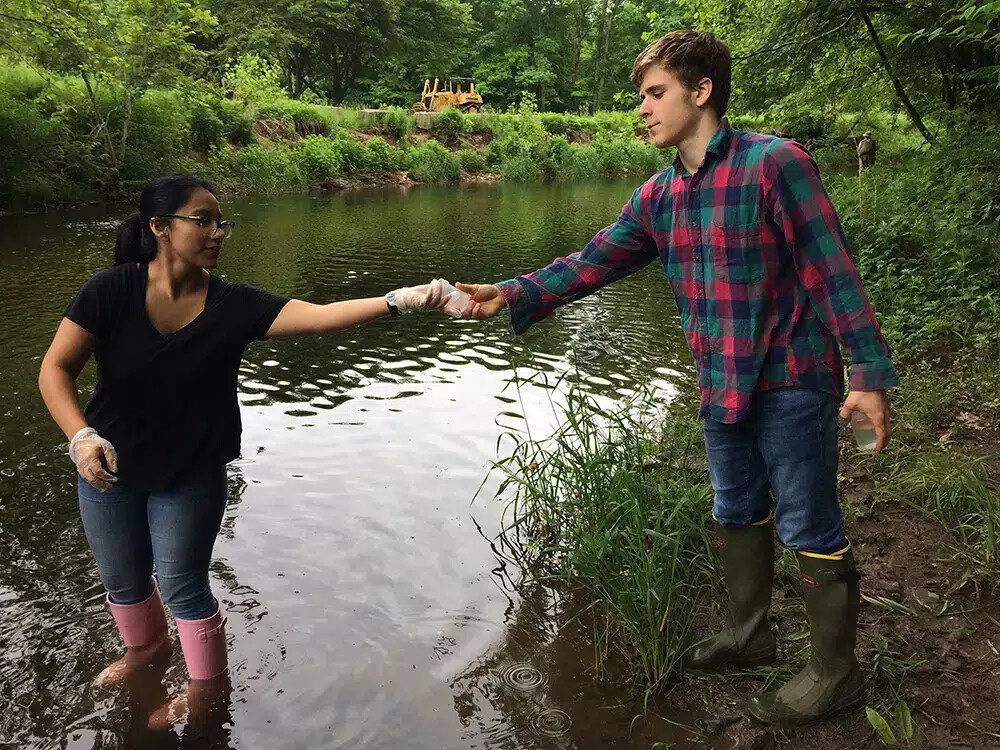Courier News: RVCC students gain real-world experience through the Center for Environmental Studies

Published 7:00 a.m. ET Nov. 12, 2018
Editor's note: Raritan Valley Community College is marking its 50th anniversary this year. An ongoing monthly series of stories will highlight different aspects of the college and its role in the life of the Central Jersey community.
Amber Lindsay turned her passion for climate change and organic agriculture into action as an environmental science major at Raritan Valley Community College (RVCC).
She participated in habitat restoration efforts along the Musconetcong River as well as on campus. She organized a “Little Scientist Night” for local school children and their families. She brought together speakers from the Sierra Club, Food & Water Watch, ReThink Energy NJ and other organizations to discuss the impact of gas and oil pipelines.
“I felt it was important to make members of the college and outside community aware of current issues that I believe need more attention,” said the Franklin Township resident.
Lindsay and her classmates are participating in these types of hands-on experiences through the college’s Center for Environmental Studies (CES). The interdisciplinary Center offers opportunities to conduct research and engage in outreach efforts to address environmental concerns on campus and in the community. Led by Dr. Jay Kelly, associate professor of biology and environmental science, and Dr. Emilie Stander, assistant professor of environmental science, the Center provides real-world opportunities for students to learn about protecting environmental and human health.
Through a range of projects focusing on such areas as water quality, forest health, sustainability, endangered species conservation and climate change, students are empowered, early in their college careers, to translate classroom learning into action.
Stryker Schultz, a civil and mechanical engineering major and vice president of the college’s Environmental Club, has been involved with a number of initiatives including helping create and maintain a roof garden and stopping the spread of invasive Norwegian maples.
“These efforts help students develop confidence, character and professional skills, all while helping municipalities, non-profits and other groups manage their forests, coastlines and other ecosystems,” said Kelly.
RVCC students and alumni have benefited from a variety of experiences including paid internships, independent research projects and opportunities to serve the community as part of their classroom curriculum. These initiatives also may be encouraging more RVCC students to major in environmental science, a program that’s grown approximately 500 percent since 2007.
Schultz, a resident of Hillsborough, and Anabel Rosero of North Plainfield both work with Stander as water quality interns with the RVCC Water Quality Laboratory. Their work includes collaborating with the Raritan Headwaters Association to monitor approximately 10 local streams and rivers for chemical and biological pollutants twice a month.
Stander launched the laboratory in 2017 with a donation from the Gibson Center for Innovation in Science and Technology at RVCC. The Gibson Center was funded by Jim and Jill Gibson to support STEM (science, technology, engineering and mathematics) educational programs at the college. The lab engages students in analyzing water samples from local water bodies using state-of-the-art technologies and methods, and provides water quality testing and research services to local environmental organizations.
In between working as an intern and managing classes as an Environmental Science major, Rosero has participated in service learning efforts that included deer surveys, beach sweeps and tree plantings, as well as restoration projects. “I wanted to be able to make a positive impact in my local community, so I always tried to volunteer and participate in as many tasks as my professors offered,” said Rosero.
One of those professors, Kelly, launched a pilot project in 2008 with his students at Island Beach State Park to help protect beach habitats from off-road vehicles. The project was an instant success, allowing for the return of globally rare beach plant species without impacting recreational uses of the beach. The project also facilitated the development and recovery of dune habitats, reduced erosion and increased the habitat for rare beach nesting birds.
Since then the project has expanded to include all of New Jersey’s state park beaches as well as other participating parks and municipalities. Students help by installing protective fences and signage, and conducting research and outreach to document the effectiveness of these activities at protecting habitat, reducing erosion and enhancing the development of dunes.
Conducted in partnership with Pinelands Preservation Alliance, the project has been supported by an $80,000 grant from NJ SeaGrant (in 2016-2017) and a $200,000 grant from the National Fish and Wildlife Foundation (for 2018-2019). Thanks to these efforts, rare beach plants have rebounded to their highest numbers in nearly 20 years, and New Jersey beaches and coastal communities are increasing their resilience to storms.
“There are so many issues the world is currently facing and it can be easy to be complacent and not do anything,” said Schultz. “Through the Environmental Club and my internship, I can actually make meaningful strides in addressing certain issues. These activities help give me a sense of purpose and direction.”

